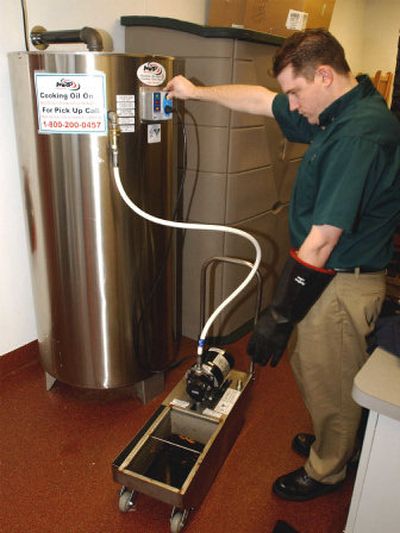Used cooking oil goes biodiesel

VANCOUVER, Wash. – Its first nickname was “R2D2” after the “Star Wars” robot, but now they just call it “the dog” when it’s time to drain the grease at Burgerville USA.
“The dog” is a small, stainless steel tank and pump combination on wheels that the Northwest restaurant chain has pioneered to channel used cooking oil to a biodiesel producer.
“It’s the wave of the future,” said Chris Wurtz, a Burgerville manager who demonstrated “the dog” at a new restaurant at the junction of Interstate 5 and Interstate 205 in Vancouver.
With the price of crude oil soaring, the restaurant industry – already the nation’s largest single employer – could make a serious contribution to the fuel supply if most of its waste cooking oil can be recycled as biodiesel, according to industry and renewable fuel experts.
“It really does hold long-term benefits, not only for the restaurant industry, but for the environment on a national basis,” said Hudson Riehle, senior vice president of research for the National Restaurant Association.
At the Burgerville restaurant, Wurtz towed “the dog” to the deep fryer, opened a steel cabinet door, turned a valve and started the oil flowing into the low-slung tank. When he had a big sample, he towed the pump to the back of the restaurant to transfer the old oil into a tall, stainless steel holding tank.
The big tank is fitted with a hose coupling that feeds through the back wall, where a truck from MRP Services, a family-owned plumbing and drain service company, can drive up, connect another hose, and drain the tank.
MRP, in turn, takes the oil to SeQuential Biofuels in neighboring Portland, where it is converted to biodiesel.
The arrangement saves Burgerville the cost of hauling away the grease, but it is expected to eventually bring in additional revenue as biodiesel producers develop a competitive market.
“It’s a win-win situation for both the restaurant operator, who now has another viable option for the disposal of old oil, as well as the general public, who benefit from energy conservation and energy source options,” Riehle said.
Used vegetable oil has been either waste or the stuff that restaurants had to pay to haul off to a rendering company that could transform it into raw material for pet food, soaps or cosmetics.
Rising fuel prices, however, are pushing a switch to converting the used cooking oil into renewable biodiesel fuel as a routine part of the restaurant business.
“For us it’s a straightforward proposition,” said Jeff Harvey, chief operating officer of The Holland Inc., parent company of the chain of 39 Burgerville restaurants.
“Waste oil is the largest byproduct of our business, and we use that byproduct to make something of value and contribute back to local communities,” Harvey said.
Burgerville restaurants now produce about 7,500 gallons of oil a month that can be turned into 6,400 gallons of biodiesel, company officials said.
Processing used cooking oil into fuel offers a grass-roots alternative to produce biodiesel at the neighborhood and even household level, using readily available equipment such as an old water heater, said Lyle Rudensey, co-founder of The Breathable Bus Coalition and a member of the NW Biodiesel Network.
Rudensey, also known as “BioLyle,” holds biodiesel workshops in the Seattle area.
“Bring your own water heater, and we’ll show you the plumbing and how it works,” he said.